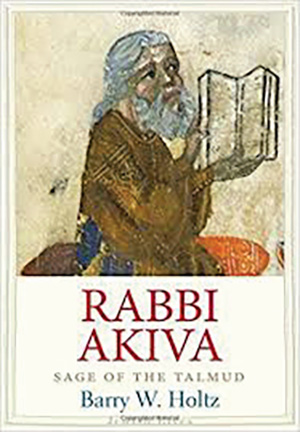









Born in the land of Israel around 50 C.E., Rabbi Akiva was the greatest rabbi of his time and one of the most important influences on Judaism as we know it today. Traditional sources tell how he was raised in poverty and unschooled in religious tradition but began to learn the Torah as an adult. In the aftermath of the destruction of Jerusalem by the Romans in 70 C.E., he helped shape a new direction for Judaism through his brilliance and his character. Mystic, legalist, theologian and interpreter, he disputed with his colleagues in dramatic fashion yet was admired and beloved by his peers. Executed by Roman authorities for his insistence on teaching Torah in public, he became the exemplar of Jewish martyrdom. Drawing on the latest historical and literary scholarship, this book goes beyond older biographies, untangling a complex assortment of ancient sources to present a clear and nuanced portrait of Talmudic hero Rabbi Akiva.
A groundbreaking use of storytelling to bear witness to the Holocaust features three generations of women’s own voices—Lili’s diary written upon liberation from Auschwitz; daughter Noemi Jaffe exploring the power of memory, survival and bearing witness; and granddaughter Leda, Noemi’s daughter, on the significance of the Holocaust and Jewish identity 70 years after the war.
One very special work of art—a Chaim Soutine painting—connects the lives and fates of two different women, generations apart, in this enthralling and transporting debut novel that moves from World War II Vienna to contemporary Los Angeles.
It is 1939 in Vienna, and as the specter of war darkens Europe, Rose Zimmer’s parents are desperate. Unable to get out of Austria, they manage to secure passage for their young daughter on a kindertransport, and send her to live with strangers in England.
Six years later, the war finally over, a grief-stricken Rose attempts to build a life for herself. Alone in London, devastated, she cannot help but try to search out one piece of her childhood—the Chaim Soutine painting her mother had cherished.
Many years later, the painting finds its way to America. In modern-day Los Angeles, Lizzie Goldstein has returned home for her father’s funeral. Newly single and unsure of her path, she also carries a burden of guilt that cannot be displaced. As a teenager years ago, Lizzie threw a party at her father’s house with unexpected but far-reaching consequences. The Soutine painting that she loved and had provided lasting comfort to her after her own mother had died was stolen, and has never been recovered.
This painting will bring Lizzie and Rose together and ignite an unexpected friendship, eventually revealing long-held secrets that hold painful truths. Spanning decades and unfolding in crystalline atmospheric prose, “The Fortunate Ones” is a haunting story of longing, devastation and forgiveness, and a deep examination of the bonds and desires that map our private histories.
The Book of Numbers, in Hebrew, Bamidbar (In the Wilderness), is a key text for our time. It is among the most searching, self-critical books in all of literature about what Nelson Mandela called the long walk to freedom. Its message is that there is no shortcut to liberty. Numbers is not an easy book to read, nor is it an optimistic one. It is a sober warning set in the midst of a text of the Hebrew Bible that remains the west’s master narrative of hope.
The Mosaic books, especially Exodus and Numbers, are about the journey from slavery to freedom and from oppression to law-governed liberty. On the map, the distance from Egypt to the Promised Land is not far. But the message of Numbers is that it always takes longer than you think. For the journey is not just physical, a walk across the desert. It is psychological, moral and spiritual. It takes as long as the time needed for human beings to change… You cannot arrive at freedom merely by escaping from slavery. It is won only when a nation takes upon itself the responsibilities of self-restraint, courage and patience. Without that, a journey of a few hundred miles can take 40 years. Even then, it has only just begun.
Will Eisner was present at the dawn of comics. In the 1940s, he pushed the boundaries of the medium with his acclaimed weekly comic strip, The Spirit, and with the publication of “A Contract with God” in 1978, he created a new medium altogether—the graphic novel. It was unlike anything seen before, heralding an era when serious cartoonists were liberated from the limiting confines of the comic strip. Eisner’s work was a shining example of what comics could be: as inventive, moving and complex as any literary art form.
Eisner considered himself “a graphic witness reporting on life, death, heartbreak and the never-ending struggle to prevail.” “A Contract with God” begins with a gripping tale that mirrors the artist’s real-life tragedy, the death of his daughter. Frimme Hersh, a devout Jew, questions his relationship with God after the loss of his own beloved child. Hersh’s crisis is intertwined with the lives of the other unforgettable denizens of Eisner’s iconic Dropsie Avenue, a fictionalized version of the quintessential New York City street where he came of age at the height of the Depression.
This centennial edition showcases Eisner’s singular visual style in new high-resolution scans of his original art, complete with an introduction by Scott McCloud and an illuminating history of Eisner’s seminal work. Now readers can experience the legendary book that launched a unique art form and reaffirmed Will Eisner as one of the great pioneers of American graphic storytelling.
Bestselling author Daniel Silva delivers another spellbinding international thriller—one that finds the legendary Gabriel Allon grappling with an ISIS mastermind.
Gabriel Allon, the art restorer, spy and assassin described as the most compelling fictional creation “since Ian Fleming put down his martini and invented James Bond” (Rocky Mountain News), is poised to become the chief of Israel’s secret intelligence service. But on the eve of his promotion, events conspire to lure him into the field for one final operation. ISIS has detonated a massive bomb in the Marais district of Paris, and a desperate French government wants Gabriel to eliminate the man responsible before he can strike again.
Acclaimed novelist Daniel Silva has thrilled, entertained and educated readers with 18 thoughtful and gripping spy novels featuring a diverse cast of compelling characters and ingenious plots that have taken them around the globe and back—from the United States to Europe, Russia to the Middle East. From its shocking opening to its explosive denouement in Washington, D.C., “The Black Widow” reveals itself as Silva’s most timely and powerful novel yet. Following the success of his smash hit “The English Spy,” this electrifying thriller showcases Silva’s consummate skill and brilliant imagination, and is a must-read for his multitude of current and future fans.
After attending her father’s funeral, former Mossad agent Rachel Goldschmitt empties her bank account and disappears. But when she makes a cryptic phone call to her former handler, Ehud, the Mossad sends him to track her down. Finding no leads, he must retrace her career as a spy to figure out why she abandoned Mossad before she can do any damage to Israel. But he soon discovers that after living undercover for so long, an agent’s assumed identity and her real one can blur, catching loyalty, love and truth between them. In the midst of a high-risk, high-stakes investigation, Ehud begins to question whether he ever knew his agent at all.
In “The English Teacher,” Yiftach R. Atir drew on his own experience in intelligence to weave a psychologically nuanced thriller that explores the pressures of living under an assumed identity for months at a time.
We all know the stereotype of the Jewish mother—hectoring, guilt-inducing, clingy as a limpet. In “Mamaleh Knows Best,” Tablet Magazine columnist Marjorie Ingall smashes this tired trope with a hammer. Blending personal anecdotes, humor, historical texts and scientific research, Ingall shares Jewish secrets for raising self-sufficient, ethical and accomplished children. She offers abundant examples showing how Jewish mothers have nurtured their children’s independence, fostered discipline, urged a healthy distrust of authority, consciously cultivated geekiness and kindness, stressed education and maintained a sense of humor. These time-tested strategies have proven successful in a wide variety of settings and fields over the vast span of history. But you don’t have to be Jewish to cultivate the same qualities in your own children.
Ingall will make you think, she will make you laugh and she will make you a better parent. You might not produce a Nobel Prize winner (or hey, you might), but you’ll definitely get a great human being.
“The Angel” is a gripping feat of reportage that exposes—for the first time in English—the sensational life and mysterious death of Ashraf Marwan, an Egyptian senior official who spied for Israel, offering new insight into the turbulent modern history of the Middle East.
As the son-in-law of Egyptian president Gamal Abdel Nasser and a close advisor to his successor, Anwar Sadat, Ashraf Marwan had access to the deepest secrets of the country’s government. But Marwan himself had a secret—he was a spy for the Mossad, Israel’s intelligence service. Under the codename “The Angel,” Marwan turned Egypt into an open book for the Israeli intelligence services—and, by alerting the Mossad in advance of the joint Egyptian-Syrian attack on Yom Kippur, saved Israel from a devastating defeat.
Drawing on meticulous research and interviews with many key participants, Uri Bar-Joseph pieces together Marwan’s story. In the process, he sheds new light on this volatile time in modern Egyptian and Middle Eastern history, culminating in 2011’s Arab Spring. “The Angel” also chronicles the discord within the Israeli government that brought down Prime Minister Golda Meir.
However, this nail-biting narrative doesn’t end with Israel’s victory in the Yom Kippur War. Marwan eluded Egypt’s ruthless secret services for many years, but then somebody talked. Five years later, in 2007, his body was found in the garden of his London apartment building. Police suspected he had been thrown from his fifth-floor balcony, and thanks to explosive new evidence, Bar-Joseph can finally reveal who, how and why.
John Yochelson was 17 when he first heard President Kennedy’s call, “Ask not what your country can do for you; ask what you can do for your country.” Responding to the call to public service, he had a front-row seat from the mid-1970s through the mid-1990s when the power game in Washington was played across party lines. “Loving and Leaving Washington” is his inside account of the lives of public servants from the perspective of a lifelong moderate.
The Center for Strategic and International Studies brought Yochelson into close contact with such heavyweights as Henry Kissinger and Federal Reserve chairman Paul Volcker; work with the Council on Competitiveness kept him at the center of action. But the rise of bare-knuckled partisanship soured him on DC. In 2001 he left power politics to fight for a cause that he believed in, launching a San Diego-based nonprofit to increase the participation of women and underrepresented minorities in science and engineering. Funding realities and family ties, however, drew him back to the beltway.
The bittersweet experience of disengaging from and returning to Washington prompted Yochelson’s candid look at the loss of middle ground in U.S. politics and the decline of public trust in government. In this illuminating memoir, he reflects on the current generation’s dedication to their country and considers the rewards, limitations and uncertain future of public service.













